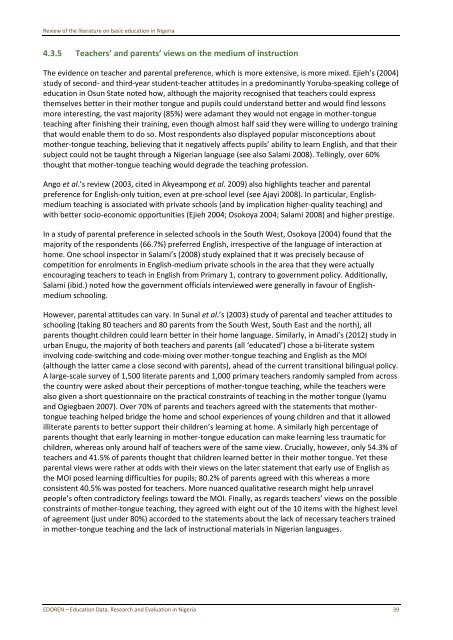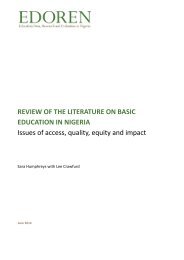Review <str<strong>on</strong>g>of</str<strong>on</strong>g> <str<strong>on</strong>g>the</str<strong>on</strong>g> <str<strong>on</strong>g>literature</str<strong>on</strong>g> <strong>on</strong> <strong>basic</strong> educati<strong>on</strong> <strong>in</strong> Nigeria4.3.5 Teachers’ and parents’ views <strong>on</strong> <str<strong>on</strong>g>the</str<strong>on</strong>g> medium <str<strong>on</strong>g>of</str<strong>on</strong>g> <strong>in</strong>structi<strong>on</strong>The evidence <strong>on</strong> teacher and parental preference, which is more extensive, is more mixed. Ejieh’s (2004)study <str<strong>on</strong>g>of</str<strong>on</strong>g> sec<strong>on</strong>d- and third-year student-teacher attitudes <strong>in</strong> a predom<strong>in</strong>antly Yoruba-speak<strong>in</strong>g college <str<strong>on</strong>g>of</str<strong>on</strong>g>educati<strong>on</strong> <strong>in</strong> Osun State noted how, although <str<strong>on</strong>g>the</str<strong>on</strong>g> majority recognised that teachers could express<str<strong>on</strong>g>the</str<strong>on</strong>g>mselves better <strong>in</strong> <str<strong>on</strong>g>the</str<strong>on</strong>g>ir mo<str<strong>on</strong>g>the</str<strong>on</strong>g>r t<strong>on</strong>gue and pupils could understand better and would f<strong>in</strong>d less<strong>on</strong>smore <strong>in</strong>terest<strong>in</strong>g, <str<strong>on</strong>g>the</str<strong>on</strong>g> vast majority (85%) were adamant <str<strong>on</strong>g>the</str<strong>on</strong>g>y would not engage <strong>in</strong> mo<str<strong>on</strong>g>the</str<strong>on</strong>g>r-t<strong>on</strong>gueteach<strong>in</strong>g after f<strong>in</strong>ish<strong>in</strong>g <str<strong>on</strong>g>the</str<strong>on</strong>g>ir tra<strong>in</strong><strong>in</strong>g, even though almost half said <str<strong>on</strong>g>the</str<strong>on</strong>g>y were will<strong>in</strong>g to undergo tra<strong>in</strong><strong>in</strong>gthat would enable <str<strong>on</strong>g>the</str<strong>on</strong>g>m to do so. Most resp<strong>on</strong>dents also displayed popular misc<strong>on</strong>cepti<strong>on</strong>s aboutmo<str<strong>on</strong>g>the</str<strong>on</strong>g>r-t<strong>on</strong>gue teach<strong>in</strong>g, believ<strong>in</strong>g that it negatively affects pupils’ ability to learn English, and that <str<strong>on</strong>g>the</str<strong>on</strong>g>irsubject could not be taught through a Nigerian language (see also Salami 2008). Tell<strong>in</strong>gly, over 60%thought that mo<str<strong>on</strong>g>the</str<strong>on</strong>g>r-t<strong>on</strong>gue teach<strong>in</strong>g would degrade <str<strong>on</strong>g>the</str<strong>on</strong>g> teach<strong>in</strong>g pr<str<strong>on</strong>g>of</str<strong>on</strong>g>essi<strong>on</strong>.Ango et al.’s <str<strong>on</strong>g>review</str<strong>on</strong>g> (2003, cited <strong>in</strong> Akyeamp<strong>on</strong>g et al. 2009) also highlights teacher and parentalpreference for English-<strong>on</strong>ly tuiti<strong>on</strong>, even at pre-school level (see Ajayi 2008). In particular, Englishmediumteach<strong>in</strong>g is associated with private schools (and by implicati<strong>on</strong> higher-quality teach<strong>in</strong>g) andwith better socio-ec<strong>on</strong>omic opportunities (Ejieh 2004; Osokoya 2004; Salami 2008) and higher prestige.In a study <str<strong>on</strong>g>of</str<strong>on</strong>g> parental preference <strong>in</strong> selected schools <strong>in</strong> <str<strong>on</strong>g>the</str<strong>on</strong>g> South West, Osokoya (2004) found that <str<strong>on</strong>g>the</str<strong>on</strong>g>majority <str<strong>on</strong>g>of</str<strong>on</strong>g> <str<strong>on</strong>g>the</str<strong>on</strong>g> resp<strong>on</strong>dents (66.7%) preferred English, irrespective <str<strong>on</strong>g>of</str<strong>on</strong>g> <str<strong>on</strong>g>the</str<strong>on</strong>g> language <str<strong>on</strong>g>of</str<strong>on</strong>g> <strong>in</strong>teracti<strong>on</strong> athome. One school <strong>in</strong>spector <strong>in</strong> Salami’s (2008) study expla<strong>in</strong>ed that it was precisely because <str<strong>on</strong>g>of</str<strong>on</strong>g>competiti<strong>on</strong> for enrolments <strong>in</strong> English-medium private schools <strong>in</strong> <str<strong>on</strong>g>the</str<strong>on</strong>g> area that <str<strong>on</strong>g>the</str<strong>on</strong>g>y were actuallyencourag<strong>in</strong>g teachers to teach <strong>in</strong> English from Primary 1, c<strong>on</strong>trary to government policy. Additi<strong>on</strong>ally,Salami (ibid.) noted how <str<strong>on</strong>g>the</str<strong>on</strong>g> government <str<strong>on</strong>g>of</str<strong>on</strong>g>ficials <strong>in</strong>terviewed were generally <strong>in</strong> favour <str<strong>on</strong>g>of</str<strong>on</strong>g> Englishmediumschool<strong>in</strong>g.However, parental attitudes can vary. In Sunal et al.’s (2003) study <str<strong>on</strong>g>of</str<strong>on</strong>g> parental and teacher attitudes toschool<strong>in</strong>g (tak<strong>in</strong>g 80 teachers and 80 parents from <str<strong>on</strong>g>the</str<strong>on</strong>g> South West, South East and <str<strong>on</strong>g>the</str<strong>on</strong>g> north), allparents thought children could learn better <strong>in</strong> <str<strong>on</strong>g>the</str<strong>on</strong>g>ir home language. Similarly, <strong>in</strong> Amadi’s (2012) study <strong>in</strong>urban Enugu, <str<strong>on</strong>g>the</str<strong>on</strong>g> majority <str<strong>on</strong>g>of</str<strong>on</strong>g> both teachers and parents (all ‘educated’) chose a bi-literate system<strong>in</strong>volv<strong>in</strong>g code-switch<strong>in</strong>g and code-mix<strong>in</strong>g over mo<str<strong>on</strong>g>the</str<strong>on</strong>g>r-t<strong>on</strong>gue teach<strong>in</strong>g and English as <str<strong>on</strong>g>the</str<strong>on</strong>g> MOI(although <str<strong>on</strong>g>the</str<strong>on</strong>g> latter came a close sec<strong>on</strong>d with parents), ahead <str<strong>on</strong>g>of</str<strong>on</strong>g> <str<strong>on</strong>g>the</str<strong>on</strong>g> current transiti<strong>on</strong>al bil<strong>in</strong>gual policy.A large-scale survey <str<strong>on</strong>g>of</str<strong>on</strong>g> 1,500 literate parents and 1,000 primary teachers randomly sampled from across<str<strong>on</strong>g>the</str<strong>on</strong>g> country were asked about <str<strong>on</strong>g>the</str<strong>on</strong>g>ir percepti<strong>on</strong>s <str<strong>on</strong>g>of</str<strong>on</strong>g> mo<str<strong>on</strong>g>the</str<strong>on</strong>g>r-t<strong>on</strong>gue teach<strong>in</strong>g, while <str<strong>on</strong>g>the</str<strong>on</strong>g> teachers werealso given a short questi<strong>on</strong>naire <strong>on</strong> <str<strong>on</strong>g>the</str<strong>on</strong>g> practical c<strong>on</strong>stra<strong>in</strong>ts <str<strong>on</strong>g>of</str<strong>on</strong>g> teach<strong>in</strong>g <strong>in</strong> <str<strong>on</strong>g>the</str<strong>on</strong>g> mo<str<strong>on</strong>g>the</str<strong>on</strong>g>r t<strong>on</strong>gue (Iyamuand Ogiegbaen 2007). Over 70% <str<strong>on</strong>g>of</str<strong>on</strong>g> parents and teachers agreed with <str<strong>on</strong>g>the</str<strong>on</strong>g> statements that mo<str<strong>on</strong>g>the</str<strong>on</strong>g>rt<strong>on</strong>gueteach<strong>in</strong>g helped bridge <str<strong>on</strong>g>the</str<strong>on</strong>g> home and school experiences <str<strong>on</strong>g>of</str<strong>on</strong>g> young children and that it allowedilliterate parents to better support <str<strong>on</strong>g>the</str<strong>on</strong>g>ir children’s learn<strong>in</strong>g at home. A similarly high percentage <str<strong>on</strong>g>of</str<strong>on</strong>g>parents thought that early learn<strong>in</strong>g <strong>in</strong> mo<str<strong>on</strong>g>the</str<strong>on</strong>g>r-t<strong>on</strong>gue educati<strong>on</strong> can make learn<strong>in</strong>g less traumatic forchildren, whereas <strong>on</strong>ly around half <str<strong>on</strong>g>of</str<strong>on</strong>g> teachers were <str<strong>on</strong>g>of</str<strong>on</strong>g> <str<strong>on</strong>g>the</str<strong>on</strong>g> same view. Crucially, however, <strong>on</strong>ly 54.3% <str<strong>on</strong>g>of</str<strong>on</strong>g>teachers and 41.5% <str<strong>on</strong>g>of</str<strong>on</strong>g> parents thought that children learned better <strong>in</strong> <str<strong>on</strong>g>the</str<strong>on</strong>g>ir mo<str<strong>on</strong>g>the</str<strong>on</strong>g>r t<strong>on</strong>gue. Yet <str<strong>on</strong>g>the</str<strong>on</strong>g>separental views were ra<str<strong>on</strong>g>the</str<strong>on</strong>g>r at odds with <str<strong>on</strong>g>the</str<strong>on</strong>g>ir views <strong>on</strong> <str<strong>on</strong>g>the</str<strong>on</strong>g> later statement that early use <str<strong>on</strong>g>of</str<strong>on</strong>g> English as<str<strong>on</strong>g>the</str<strong>on</strong>g> MOI posed learn<strong>in</strong>g difficulties for pupils; 80.2% <str<strong>on</strong>g>of</str<strong>on</strong>g> parents agreed with this whereas a morec<strong>on</strong>sistent 40.5% was posted for teachers. More nuanced qualitative research might help unravelpeople’s <str<strong>on</strong>g>of</str<strong>on</strong>g>ten c<strong>on</strong>tradictory feel<strong>in</strong>gs toward <str<strong>on</strong>g>the</str<strong>on</strong>g> MOI. F<strong>in</strong>ally, as regards teachers’ views <strong>on</strong> <str<strong>on</strong>g>the</str<strong>on</strong>g> possiblec<strong>on</strong>stra<strong>in</strong>ts <str<strong>on</strong>g>of</str<strong>on</strong>g> mo<str<strong>on</strong>g>the</str<strong>on</strong>g>r-t<strong>on</strong>gue teach<strong>in</strong>g, <str<strong>on</strong>g>the</str<strong>on</strong>g>y agreed with eight out <str<strong>on</strong>g>of</str<strong>on</strong>g> <str<strong>on</strong>g>the</str<strong>on</strong>g> 10 items with <str<strong>on</strong>g>the</str<strong>on</strong>g> highest level<str<strong>on</strong>g>of</str<strong>on</strong>g> agreement (just under 80%) accorded to <str<strong>on</strong>g>the</str<strong>on</strong>g> statements about <str<strong>on</strong>g>the</str<strong>on</strong>g> lack <str<strong>on</strong>g>of</str<strong>on</strong>g> necessary teachers tra<strong>in</strong>ed<strong>in</strong> mo<str<strong>on</strong>g>the</str<strong>on</strong>g>r-t<strong>on</strong>gue teach<strong>in</strong>g and <str<strong>on</strong>g>the</str<strong>on</strong>g> lack <str<strong>on</strong>g>of</str<strong>on</strong>g> <strong>in</strong>structi<strong>on</strong>al materials <strong>in</strong> Nigerian languages.EDOREN – Educati<strong>on</strong> Data, Research and Evaluati<strong>on</strong> <strong>in</strong> Nigeria 39
Review <str<strong>on</strong>g>of</str<strong>on</strong>g> <str<strong>on</strong>g>the</str<strong>on</strong>g> <str<strong>on</strong>g>literature</str<strong>on</strong>g> <strong>on</strong> <strong>basic</strong> educati<strong>on</strong> <strong>in</strong> Nigeria4.3.6 ‘Mo<str<strong>on</strong>g>the</str<strong>on</strong>g>r-t<strong>on</strong>gue’ teach<strong>in</strong>g for marg<strong>in</strong>alised groupsIn c<strong>on</strong>trast, <str<strong>on</strong>g>the</str<strong>on</strong>g> case for mo<str<strong>on</strong>g>the</str<strong>on</strong>g>r-t<strong>on</strong>gue teach<strong>in</strong>g is more widely requested and accepted <strong>in</strong> relati<strong>on</strong> to<str<strong>on</strong>g>the</str<strong>on</strong>g> <strong>in</strong>clusive educati<strong>on</strong> <str<strong>on</strong>g>of</str<strong>on</strong>g> m<strong>in</strong>ority and/or marg<strong>in</strong>alised ethnic groups (Usman 2006; Co<strong>in</strong>co 2012; Littleand Lewis 2012), as evidenced <strong>in</strong> <str<strong>on</strong>g>the</str<strong>on</strong>g> large-scale implementati<strong>on</strong> <str<strong>on</strong>g>of</str<strong>on</strong>g> nomadic schools for Hausa-Fulan<strong>in</strong>omadic pastoralists <strong>in</strong> nor<str<strong>on</strong>g>the</str<strong>on</strong>g>rn Nigeria. Greater parental commitment to formal school<strong>in</strong>g has beendem<strong>on</strong>strated when learn<strong>in</strong>g and teach<strong>in</strong>g materials are <strong>in</strong> Fulfulde (see McCaffery et al. 2006; Usman2006).O<str<strong>on</strong>g>the</str<strong>on</strong>g>r studies have also reported positive reacti<strong>on</strong>s for m<strong>in</strong>ority ethno-l<strong>in</strong>guistic groups when a teacherhas been employed who speaks <str<strong>on</strong>g>the</str<strong>on</strong>g>ir language(s) (Little and Lewis 2012), although <strong>in</strong> <str<strong>on</strong>g>the</str<strong>on</strong>g> case <str<strong>on</strong>g>of</str<strong>on</strong>g> Hausa-Fulani children learn<strong>in</strong>g <strong>in</strong> a separate class with a Fulani teacher <strong>in</strong> standard government schools <str<strong>on</strong>g>the</str<strong>on</strong>g>yalso cauti<strong>on</strong> aga<strong>in</strong>st re<strong>in</strong>forc<strong>in</strong>g <str<strong>on</strong>g>the</str<strong>on</strong>g> group’s isolati<strong>on</strong> from o<str<strong>on</strong>g>the</str<strong>on</strong>g>r cultures and languages. In Sunal et al.’s(2003) study half <str<strong>on</strong>g>the</str<strong>on</strong>g> parents and all <str<strong>on</strong>g>the</str<strong>on</strong>g> teachers noted that children from ethno-l<strong>in</strong>guistic m<strong>in</strong>oritieswere discouraged from complet<strong>in</strong>g school because <str<strong>on</strong>g>of</str<strong>on</strong>g> <str<strong>on</strong>g>the</str<strong>on</strong>g> lack <str<strong>on</strong>g>of</str<strong>on</strong>g> opportunity to learn <strong>in</strong> <str<strong>on</strong>g>the</str<strong>on</strong>g>ir firstlanguage. A few parents from m<strong>in</strong>ority l<strong>in</strong>guistic groups <strong>in</strong>volved <strong>in</strong> <str<strong>on</strong>g>the</str<strong>on</strong>g> study c<strong>on</strong>firmed that <str<strong>on</strong>g>the</str<strong>on</strong>g>y hadnot enrolled <str<strong>on</strong>g>the</str<strong>on</strong>g>ir children <strong>in</strong> school because <str<strong>on</strong>g>the</str<strong>on</strong>g> exclusi<strong>on</strong> <str<strong>on</strong>g>of</str<strong>on</strong>g> <str<strong>on</strong>g>the</str<strong>on</strong>g>ir language made <str<strong>on</strong>g>the</str<strong>on</strong>g>m feeldisc<strong>on</strong>nected from <str<strong>on</strong>g>the</str<strong>on</strong>g>ir culture. In ESSPIN-supported states, SBMC and o<str<strong>on</strong>g>the</str<strong>on</strong>g>r community membershave shown some awareness <str<strong>on</strong>g>of</str<strong>on</strong>g> <str<strong>on</strong>g>the</str<strong>on</strong>g> need for fur<str<strong>on</strong>g>the</str<strong>on</strong>g>r recruitment <str<strong>on</strong>g>of</str<strong>on</strong>g> m<strong>in</strong>ority-language speakers <strong>in</strong> orderto improve excluded m<strong>in</strong>orities’ participati<strong>on</strong> <strong>in</strong> school<strong>in</strong>g (Little and Lewis 2012; P<strong>in</strong>nock 2012).However, <str<strong>on</strong>g>the</str<strong>on</strong>g> same authors note <str<strong>on</strong>g>the</str<strong>on</strong>g> general absence <str<strong>on</strong>g>of</str<strong>on</strong>g> discussi<strong>on</strong> am<strong>on</strong>g SBMC members aboutEnglish as <str<strong>on</strong>g>the</str<strong>on</strong>g> MOI be<strong>in</strong>g a barrier to learn<strong>in</strong>g more generally, speculat<strong>in</strong>g that it may be because <str<strong>on</strong>g>the</str<strong>on</strong>g>ysee it as be<strong>in</strong>g outside <str<strong>on</strong>g>the</str<strong>on</strong>g>ir remit (ibid.), although it may also be because <str<strong>on</strong>g>the</str<strong>on</strong>g>y believe that learn<strong>in</strong>g <strong>in</strong>English necessarily equates with better learn<strong>in</strong>g <str<strong>on</strong>g>of</str<strong>on</strong>g> English.4.4 Teach<strong>in</strong>g methodsThe <strong>in</strong>teracti<strong>on</strong> between teachers and learners lies at <str<strong>on</strong>g>the</str<strong>on</strong>g> heart <str<strong>on</strong>g>of</str<strong>on</strong>g> educati<strong>on</strong>al quality. Put ano<str<strong>on</strong>g>the</str<strong>on</strong>g>r way:What teachers do, or do not do, are able or not able to do, are will<strong>in</strong>g, or not will<strong>in</strong>g to do, what <str<strong>on</strong>g>the</str<strong>on</strong>g>y doproperly or poorly determ<strong>in</strong>es, to a great extent, <str<strong>on</strong>g>the</str<strong>on</strong>g> effective curriculum (what pupils learn) (FME 2011a:60).Improvements to <strong>in</strong>frastructural facilities are almost mean<strong>in</strong>gless without good-quality teach<strong>in</strong>g, whichdepends, to a large extent, <strong>on</strong> <str<strong>on</strong>g>the</str<strong>on</strong>g> quality <str<strong>on</strong>g>of</str<strong>on</strong>g> <strong>in</strong>teracti<strong>on</strong> between teacher and pupils. The nati<strong>on</strong>al policy<strong>on</strong> educati<strong>on</strong> states that <strong>on</strong>e <str<strong>on</strong>g>of</str<strong>on</strong>g> <str<strong>on</strong>g>the</str<strong>on</strong>g> goals <str<strong>on</strong>g>of</str<strong>on</strong>g> primary educati<strong>on</strong> is to ‘lay a sound basis for scientific andreflective th<strong>in</strong>k<strong>in</strong>g’ and <str<strong>on</strong>g>the</str<strong>on</strong>g>refore to aim for teach<strong>in</strong>g that uses ‘practical, exploratory and experimentalmethods’ (FME 2004a: 14–15). However, classroom observati<strong>on</strong>s overwhelm<strong>in</strong>gly show that traditi<strong>on</strong>aldidactic methods persist for a variety <str<strong>on</strong>g>of</str<strong>on</strong>g> <str<strong>on</strong>g>the</str<strong>on</strong>g> reas<strong>on</strong>s explored below.There are few available empirical studies that have focused <strong>on</strong> <str<strong>on</strong>g>the</str<strong>on</strong>g> quality <str<strong>on</strong>g>of</str<strong>on</strong>g> classroom teach<strong>in</strong>g,although two large-scale, primarily quantitative classroom-based studies reveal similar patterns andcome to similar c<strong>on</strong>clusi<strong>on</strong>s about pedagogy. Hardman et al. (2008) c<strong>on</strong>ducted a video-based analysis <str<strong>on</strong>g>of</str<strong>on</strong>g><str<strong>on</strong>g>the</str<strong>on</strong>g> classroom IRF (<strong>in</strong>itiati<strong>on</strong>–resp<strong>on</strong>se–feedback) sequence <strong>in</strong> Primary 6 Maths, English and Scienceless<strong>on</strong>s, and a more detailed discourse analysis <str<strong>on</strong>g>of</str<strong>on</strong>g> some less<strong>on</strong>s accompanied by 59 teacherquesti<strong>on</strong>naires <strong>in</strong> a sample <str<strong>on</strong>g>of</str<strong>on</strong>g> 20 primary schools, from 10 states, ma<strong>in</strong>ly <strong>in</strong> <str<strong>on</strong>g>the</str<strong>on</strong>g> north. The basel<strong>in</strong>esurvey for classroom teach<strong>in</strong>g and learn<strong>in</strong>g practices <strong>in</strong> <str<strong>on</strong>g>the</str<strong>on</strong>g> five ESSPIN states (Davis<strong>on</strong> 2010) comprisedsystematic observati<strong>on</strong>s quantify<strong>in</strong>g behaviours <strong>in</strong> over 1,000 Maths and English less<strong>on</strong>s <strong>in</strong> over 500public primary schools and JSSs. In additi<strong>on</strong>, Adekola’s (2007) syn<str<strong>on</strong>g>the</str<strong>on</strong>g>sis report summarises f<strong>in</strong>d<strong>in</strong>gs fromclassroom observati<strong>on</strong>s from various nati<strong>on</strong>al studies. The 2004 ESA also <strong>in</strong>terviewed large numbers <str<strong>on</strong>g>of</str<strong>on</strong>g>teachers and pupils about teach<strong>in</strong>g methods, although <str<strong>on</strong>g>the</str<strong>on</strong>g>re were no reports <str<strong>on</strong>g>of</str<strong>on</strong>g> observati<strong>on</strong>al studieswith which to compare <str<strong>on</strong>g>the</str<strong>on</strong>g> <strong>in</strong>terview data (FME 2005).EDOREN – Educati<strong>on</strong> Data, Research and Evaluati<strong>on</strong> <strong>in</strong> Nigeria 40
- Page 1 and 2:
REVIEW OF THE LITERATURE ON BASICED
- Page 3 and 4:
Review of
- Page 5 and 6:
Review of
- Page 7 and 8:
Review of
- Page 9 and 10:
Review of
- Page 11 and 12:
Review of
- Page 13 and 14:
Review of
- Page 15 and 16: Review of
- Page 17 and 18: Review of
- Page 19 and 20: Review of
- Page 21 and 22: Review of
- Page 23 and 24: Review of
- Page 25 and 26: Review of
- Page 27 and 28: Review of
- Page 29 and 30: Review of
- Page 31 and 32: Review of
- Page 33 and 34: Review of
- Page 35 and 36: Review of
- Page 37 and 38: Review of
- Page 39 and 40: Review of
- Page 41 and 42: Review of
- Page 43 and 44: Review of
- Page 45 and 46: Review of
- Page 47 and 48: Review of
- Page 49 and 50: Review of
- Page 51 and 52: Review of
- Page 53 and 54: Review of
- Page 55 and 56: Review of
- Page 57 and 58: Review of
- Page 59 and 60: Review of
- Page 61 and 62: Review of
- Page 63 and 64: Review of
- Page 65: Review of
- Page 69 and 70: Review of
- Page 71 and 72: Review of
- Page 73 and 74: Review of
- Page 75 and 76: Review of
- Page 77 and 78: Review of
- Page 79 and 80: Review of
- Page 81 and 82: Review of
- Page 83 and 84: Review of
- Page 85 and 86: Review of
- Page 87 and 88: Review of
- Page 89 and 90: Review of
- Page 91 and 92: Review of
- Page 93 and 94: Review of
- Page 95 and 96: Review of
- Page 97 and 98: Review of
- Page 99 and 100: Review of
- Page 101 and 102: Review of
- Page 103 and 104: Review of
- Page 105 and 106: Review of
- Page 107 and 108: Review of
- Page 109 and 110: Review of
- Page 111 and 112: Review of
- Page 113 and 114: Review of
- Page 115 and 116: Review of
- Page 117 and 118:
Review of
- Page 119 and 120:
Review of
- Page 121 and 122:
Review of
- Page 123 and 124:
Review of
- Page 125 and 126:
Review of
- Page 127 and 128:
Review of
- Page 129 and 130:
Review of
- Page 131 and 132:
Review of
- Page 133 and 134:
Review of
- Page 135 and 136:
Review of
- Page 137 and 138:
Review of
- Page 139 and 140:
Review of
- Page 141 and 142:
Review of
- Page 143 and 144:
Review of
- Page 145 and 146:
Review of
- Page 147 and 148:
Review of
- Page 149 and 150:
Review of
- Page 151 and 152:
Review of
- Page 153 and 154:
Review of
- Page 155 and 156:
Review of
- Page 157 and 158:
Review of
- Page 159 and 160:
Review of
- Page 161 and 162:
Review of
- Page 163 and 164:
Review of
- Page 165 and 166:
Review of
- Page 167 and 168:
Review of
- Page 169 and 170:
Review of
- Page 171 and 172:
Review of
- Page 173 and 174:
Review of
- Page 175 and 176:
Review of
- Page 177 and 178:
Review of
- Page 179 and 180:
Review of
- Page 181 and 182:
Review of
- Page 183 and 184:
Review of
- Page 185 and 186:
Review of
- Page 187 and 188:
Review of
- Page 189 and 190:
Review of
- Page 191 and 192:
Review of
- Page 193 and 194:
Review of
- Page 195 and 196:
Review of
- Page 197 and 198:
Review of
- Page 199 and 200:
Review of
- Page 201 and 202:
Review of
- Page 203 and 204:
Review of
- Page 205 and 206:
Review of
- Page 207 and 208:
Review of
- Page 209 and 210:
Review of



